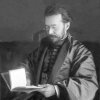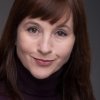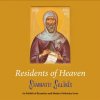SERBIAN ORTHODOX APOSTLE TO AMERICA
by Hieromonk Damascene (Christensen)
St. Herman of Alaska Monastery, Platina, California
1. An Apostle of Universal Significance
Born during the presidency of Abraham Lincoln, Archimandrite Sebastian Dabovich has the distinction of being the first person born in the United States of America to be ordained as an Orthodox priest,[1] and also the first native-born American to be tonsured as an Orthodox monk. His greatest distinction, however, lies in the tremendous apostolic, pastoral, and literary work that he accomplished during the forty-eight years of his priestly ministry. Known as the "Father of Serbian Orthodoxy in America,"[2] he was responsible for the founding of the first Serbian churches in the NewWorld. This, however, was only one part of his life's work, for he tirelessly and zealously sought to spread the Orthodox Faith to all peoples, wherever he was called. He was an Orthodox apostle of universal significance.
Describing the vast scope of Fr. Sebastian's missionary activity, Bishop Irinej (Dobrijevic) of Australia and New Zealand has written:
"Without any outside funding or organizational support, he carried the gospel of peace from country to country.... Concentrating much of his work in the United States, he ceaselessly traveled back and forth across the American continent, using every available mode of transportation—from stagecoach to railroad to foot. His wider ministry stretched from the Aleutian Peninsula of Alaska, to Russia and Japan, to small Balkan towns on the coasts of the Black and Adriatic Seas."[3] It is said that Fr. Sebastian baptized more people than any other Serbian priest of theWestern Hemisphere.[4] St. Nicholai (Velimirovich)[5]of Zhicha, Serbia, who buried Fr. Sebastian at the ZhichaMonastery when the latter reposed there in 1940, called him "a viceless man" and fittingly designated him "the greatest Serbian missionary of modern times."[6]
---
[1] Alaskan-born priests were ordained before Fr. Sebastian, but this was when Alaska was still part of Russia.
[2] Mirko Dobrijevic (later Irinej, Bishop of Australia and New Zealand), "The First American Serbian Apostle—Archimandrite Sebastian Dabovich," Again, vol. 16, no. 4 (December 1993), pp. 13–14.
[3] Ibid., p. 13.
[4] John R. Palandech, Commemorative Book of the Serbian Orthodox Church in Chicago, 1905–1955. Quoted in Mirko Dobrijevic (Bishop Irinej), p. 15.
[5] In this article we have spelled St. Nicholai's given (first) name in the way that he himself spelled it when writing in English.
[6] Bishop Nicholai (Velimirovich), "Father Sebastian Dabovich," in Serb National Federation Commemorative Book, 1951.






